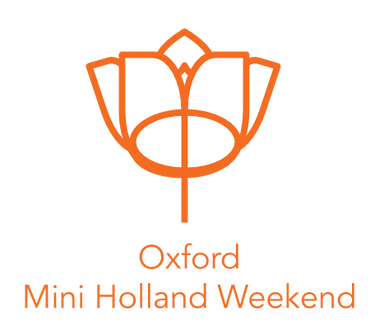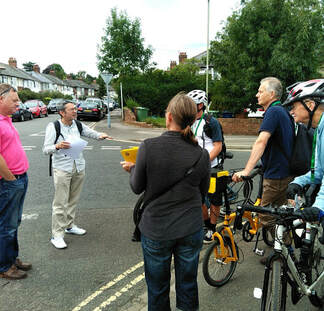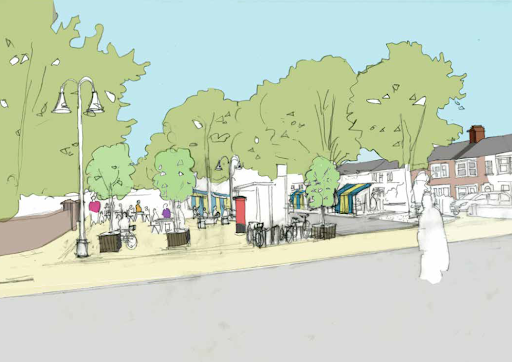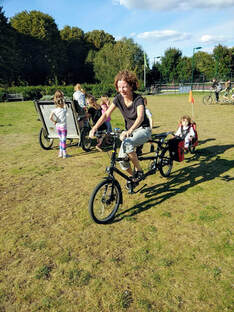|
September 7-9 was Oxford Mini Holland Weekend. The weekend comprised three events, ending with an evening presentation at the Florence Park Community Centre. The weekend exceeded expectations. Not only were all the events well attended, but there was just not as much pushback as had been expected. After all, the actual 'Mini Holland' scheme in Waltham Forest has been contentious. So much so, that some feel the name itself is tainted. I disagree but I do understand the objection. But we should be wary of overdoing that contention. High-volume? Yes! Visible? Yes! A majority of public opinion? Hardly. As I've mentioned elsewhere, the voters in Waltham Forest returned their governing party to power with a bigger majority. If the voters there were upset about Mini Holland, they have a funny way of showing it. Saturday Back in Oxford, we ran simultaneous workshops morning and afternoon as part of the Cyclox-Brookes 'Like Riding a Bike' conference. While one workshop was presenting on the concepts of LTN, the other was doing an on-site inspection of liveability changes envisioned for Florence Park, Oxford. Both elements worked fabulously. People really enjoyed hearing about the LTN and the Waltham Forest journey, particularly as it was co-presented by Paul Gasson, a person intimately involved in getting and implementing the scheme. The presentation covered a number of elements, from basic terminology through to a detailed costing of one example application of an LTN in Oxford. The groups visiting Florence Park engaged in big discussions about the opportunities to improve liveability by tightening traffic junctions, neighbourhood entrances and installing modal filters and parklets to take out through-traffic and enhance the public realm. One of the more exciting elements was picturing the area in front ot the Jolly Postboys as a plaza, abuzz with patrons of the pub, or farmers' market stalls, or just passersby. As important as the workshops were, the stall in the conference hall was a big hit. People gathered around the imagery and maps on easels, with an idea and costed budget of how Florence Park could be made into a low-traffic neighbourhood. Great conversations were had and one or two OLS t-shirts were shifted. Sunday Those same easels were on display at the Nursery at Flo's - The Place in the Park in Florence Park from 2-5 pm. Tireless volunteers discussed the images and the budget for a low-traffic neighbourhood with people visiting the easels. Numbers doubled when a 30-strong 'cycle bus' arrived from Headington -- the 'Headington Bike Bus' in fact. And then the gathering of large bicycles, called Oxford Maxi Holland, took shape in the former bowls area. Soon we were knee-deep in cargo bikes, bakfiets, trikes, tandems, triples and trailers. The weather was immaculate and people found themselves staying and chatting in until sunset. Among them was Oxford East MP the Rt Hon Anneliese Dodds, there to judge the children's drawing competition. Children were asked to draw their ideal street. The winner managed to smuggle an ice cream cone into his drawing. Over a dozen prizes were awarded, which had been kindly donated by an OLS member. The OLS video was on display inside the nursery, along with videos showing the 1972 children's fightback against cars in the De Pijp neighbourhood of Amsterdam, a Living Streets video about Donald Appleyard's research documenting the way car traffic tears communities apart, and a Streetfilms video about life on a Dutch woonerf. Monday A crowd 60-strong gathered at the Florence Park Community Centre to hear about the Waltham Forest Mini Holland and how its principles of low-traffic design could be adopted in Oxford. Despite some severe AV glitches, the presenters got their messages across and had a great reception. Kicking off the evening, host Tom Sinclair said, "Our streets used to be places where cars interrupted play. Today, in order to play we have to interrupt the cars." Our guest from Waltham Forest, Paul Gasson, spoke about the benefits of doing an LTN but also the challenge of asking people to think differently about what extent cars should be given free rein in their residential environments. Simon Pratt of Sustrans and OLS discussed the concept of traffic evaporation and the likelihood that neighbouring areas would not be 'gridlocked' simply because rat-runs in Florence Park were closed. The concept was certainly not left unchallenged, and the public will have to investigate for themselves whether 'evaporation' is a myth or reality. I myself showed the bus-performance timetables I'd downloaded from Transport for London that very day. These showed Waltham Forest bus-timetable performance every bit as good as Lewisham's, to use one example. Apart from one anxiety over traffic displacement, the crowd was very supportive and indeed enthusiastic. The biggest voices of concern were simply scepticism that the highways authority -- a rural-dominated county council -- would spend money on the Flo Park estate. I expressed the view that the county council were actually pretty keen, of course with a public consultation, and that the money would be found. In the context of transport budgets, the envisioned numbers are not very big. And nothing can compare with an LTN in terms of return on investment. The public health benefits are already demonstrable in Waltham Forest. Final thoughts The weekend simply would not have happened without the energy and help of dozens of people. They range from our constituency MP Anneliese Dodds to the architecture firm Original Field to the many who contributed to the Spacehive crowdfunder, which unlocked a costed budget for an LTN, useable by anyone who wants to think through these solutions where they live. Special thanks go out to Paul Gasson, who gave so generously of his time and enthusiasm. He joined us on the Saturday and Monday, coming up from Waltham Forest on both occasions. OLS members and directors were also hugely generous with their time and energy, along with OLS supporters and friends. Last but not least, we are grateful to Cyclox and Oxford Brookes for inviting us to participate in the Saturday conference and to the Brookes Co-CAFE / Cycle Boom! team for being our partner in helping promote an 8/80 (or 9/90) world in our midst. So the question now will come to a combination of making the budget decision and winning the public's qualified support for a scheme. A consultation on LTNs as a concept may come out soon. And the county council has just launched a consultation on a traffic filter on Walton Street in Jericho, having learned how well it worked when the road was closed for a long period for water main repairs. I have no idea about Florence Park. I can see how it might be delayed now that the county council, along with the city council, has launched an ambitious proposal for traffic remedies across the city. When and if a specific LTN proposal for anywhere in Oxford or Oxfordshire does come out, I hope that Oxford Mini Holland Weekend will have gone some way toward creating a favourable environment for it. The views shared in this blog article are that of the author Scott Urban and may not represent Co-CAFE
1 Comment
|
AuthorsCo-CAFE is led by Tim Jones (Reader in Urban Mobility) with Ben Spencer (Research Fellow) and Tom Shopland (Co-CAFE project administrator) based in the School of the Built Environment at Oxford Brookes University. Archives
February 2020
Categories |
|
Oxford Brookes University
School of the Built Environment +44 1865 48 4061 |
|
Funded by the Lifelong Health and Wellbeing cross-Council programme. Grant No. EP/KO37242/1
|







 RSS Feed
RSS Feed


